Andris Romanovskis has spent the last decade building something still quite rare in the specialty coffee world: a culture of care. He’s not only Head of Coffee at Rocket Bean in Riga, but also leads its Human Resources – a dual role that reflects his belief that a great experience begins behind the bar.
Beyond the cafés, Andris thrives in Latvia’s growing coffee community. He organises events where baristas and enthusiasts come together to learn, compete, and connect. For him, coffee isn’t just a beverage, it’s a platform for collaboration.
His focus is clear: elevate people, not just brews. Through training, competitions, and everyday care, Andris is helping shape a coffee culture that values skill, service, and shared passion.
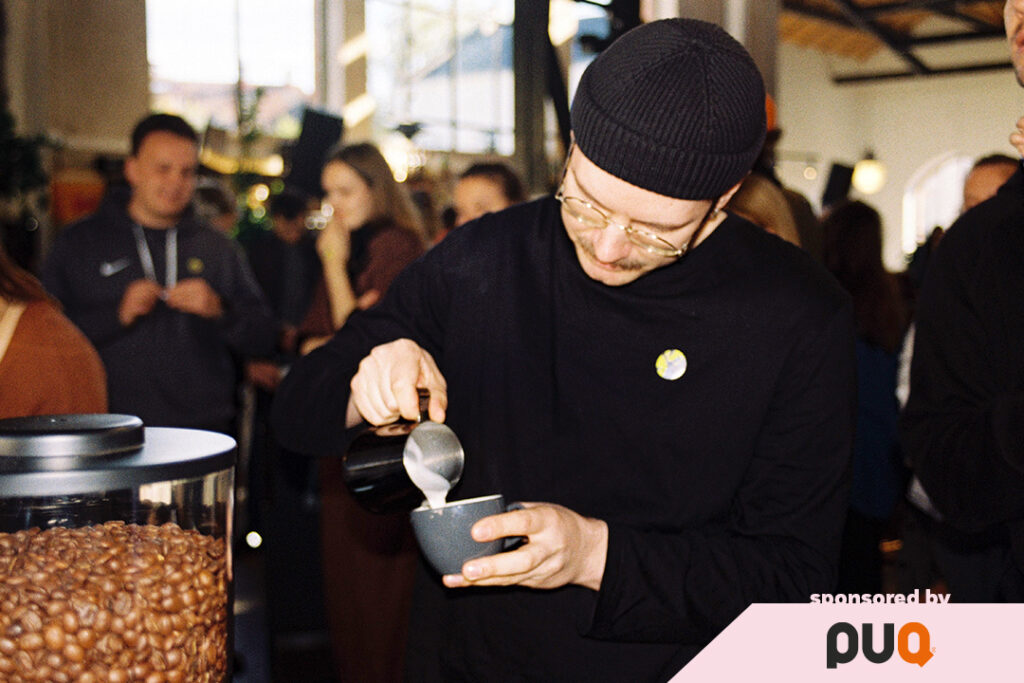
Andris, what is your first memory with coffee?
My earliest memory of coffee isn’t especially vivid; rather, it was my first encounter with specialty coffee that left a lasting impression. By chance, I tasted an Ethiopian espresso – remarkably juicy, citrusy, and layered with chocolate notes. It was a transformative moment that sparked a deep fascination with specialty coffee. Over a decade has passed, and that initial experience continues to shape my journey in the industry.
What inspired you to pursue a career in the coffee industry, and how did you get started?
Just like when hiking, I’ve always been curious to see what’s beyond the next mountain. Coffee gave me that same feeling – an endless world of flavours and knowledge, always changing with new harvests and new experiences each year. While working at a hostel, a café opened on the ground floor. I saw it as a sign and decided to start working there as a barista. That’s when my real journey into specialty coffee began.
Tell us a bit about your current work. What is your role there?
Rocket Bean is one of the top speciality coffee spots in Riga, renowned for its exceptional beans, cool vibes, and in-house roastery. We operate several cafés across the city, consistently offering carefully sourced specialty coffees and innovative brews that highlight each harvest’s unique flavours. My role at Rocket Bean is managing five cafés as the Head of Human Resources and Coffee.
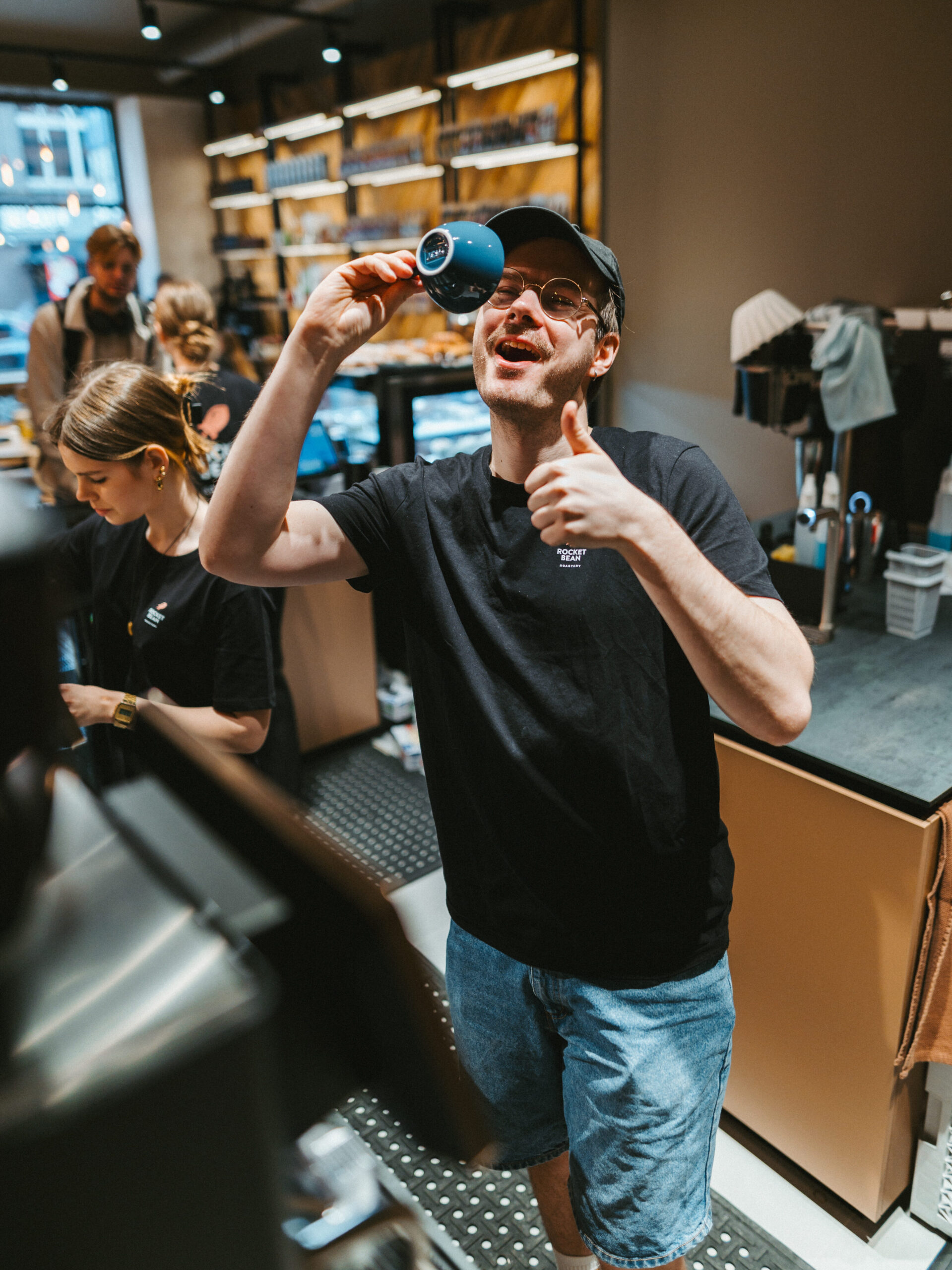
What kind of experience do you want your customers to have when they visit you at the café?
I strive to create a cozy atmosphere in our cafés where everyone can enjoy specialty coffee paired with excellent, proactive, and efficient service. My goal is to turn every stranger into a regular guest.
You are responsible for HR at Rocket Bean. It is so necessary and yet so rare in our industry. Why do you think it’s important to have HR systems implemented in a coffee business?
Having HR systems in a coffee business is crucial because baristas are the face of the brand and directly shape the customer experience. Baristas must grow alongside the company and feel supported to develop their skills without burning out. Clear communication, proper training, and a positive work environment help keep them motivated and engaged, ensuring high-quality coffee and a welcoming atmosphere for our customers.
What is your favourite part of the day at work, and why? Which responsibilities do you enjoy the most?
My favourite part of the day is the morning – seeing people flow into the cafés for their coffee is such a special energy. The greatest joy is watching their faces as they truly enjoy their cup. What I enjoy most are those moments when I’ve been able to motivate my team and show them how to work professionally while still enjoying the process.
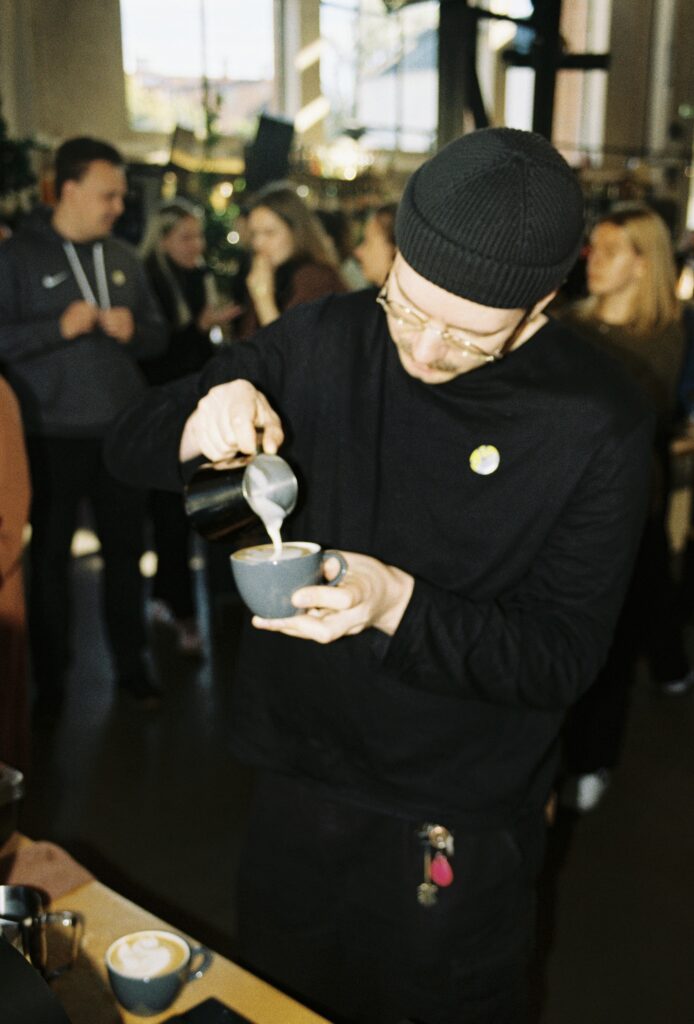
How do you stay motivated and inspired to keep improving your coffee-making skills?
My biggest motivation is the spirit of competition – both among colleagues and through participating in actual competitions. I actively create friendly contests and training sessions within our team to keep everyone engaged and improving. Additionally, I organise coffee competitions on a national and Baltic level, such as the Coffee Triathlon. These events constantly challenge me to refine my skills and stay at the top of my game
What are the current trends in cafes in your region? Are there any trends you promote yourself and would like to see more often in other places?
In our region, specialty coffee is still often misunderstood or unfamiliar to many people. While awareness is growing, there’s still a long way to go in terms of educating the general public about what coffee really means. That said, it’s encouraging to see the number of specialty coffee shops increasing each year. For example, at Rocket Bean, we now operate five cafes in Riga, which reflects the growing interest and demand.
At the same time, there’s a wider shift towards sustainability, quality, and personalised experiences – from using locally roasted beans and minimising waste, to offering workshops and tastings. One trend I promote is creating a sense of community through coffee. That’s why I organise events like the Coffee Triathlon. I’d love to see more cafes embrace this approach – using coffee as a platform for collaboration, creativity, and shared passion.
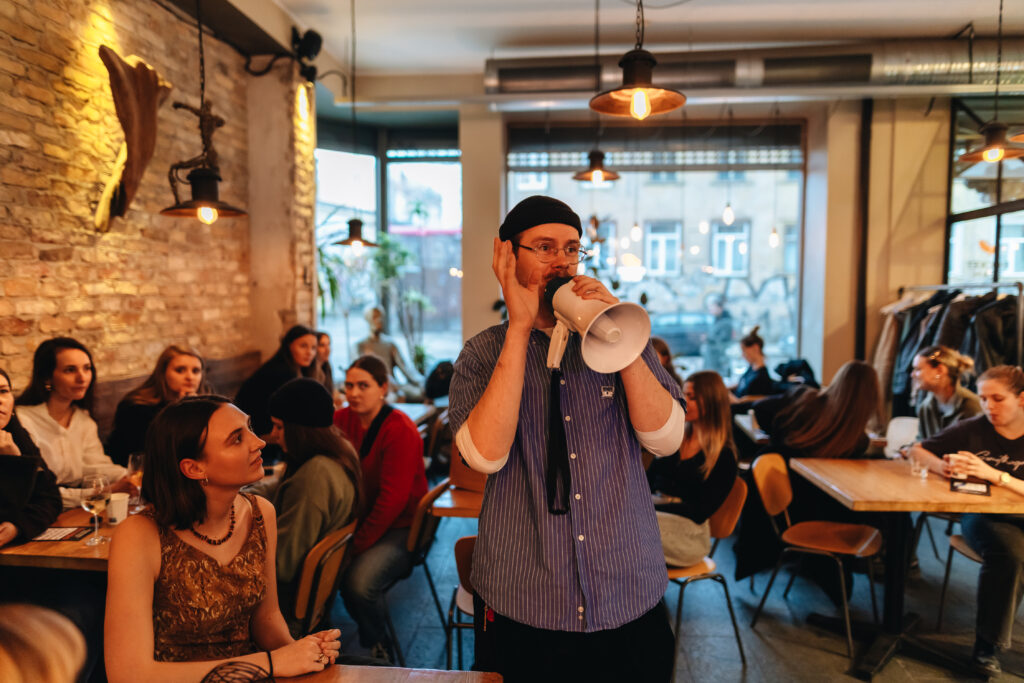
What are some common misconceptions about our industry that you’ve encountered, and how do you address them?
One common misconception – especially among people outside the industry – is that acidity in coffee is a bad thing. Many assume it means the coffee is sour or unpleasant, especially if they haven’t tried high-quality, well-brewed specialty coffee.
To help change that perception, we organise coffee cuppings where people can explore the full range of flavours and better understand the complexity of coffee. We also classify the coffees we taste into categories like bronze, silver, gold, and ruby to make the experience more engaging and relatable. It’s a fun and educational way to shift the conversation and open people up to the diversity and richness of specialty coffee.
Can you tell me about a time when you had to train a new barista? How did you approach the training process, and what did you focus on?
Training new baristas is a regular part of my work – I do it almost every week. My approach is shaped by how I wish I had been trained when I was starting out. I aim to give each new barista a strong foundation to build their future knowledge and practical skills on.
I structure the training to be clear, engaging, and supportive, focusing on both technical skills and understanding the ‘why’ behind every step. I use visual tools and hands-on practice to make learning easier and more memorable – things like brew charts, extraction visuals, and workflow diagrams.
Ultimately, my goal is not just to teach them how to make coffee, but to help them feel confident, curious, and motivated to keep growing in the craft.
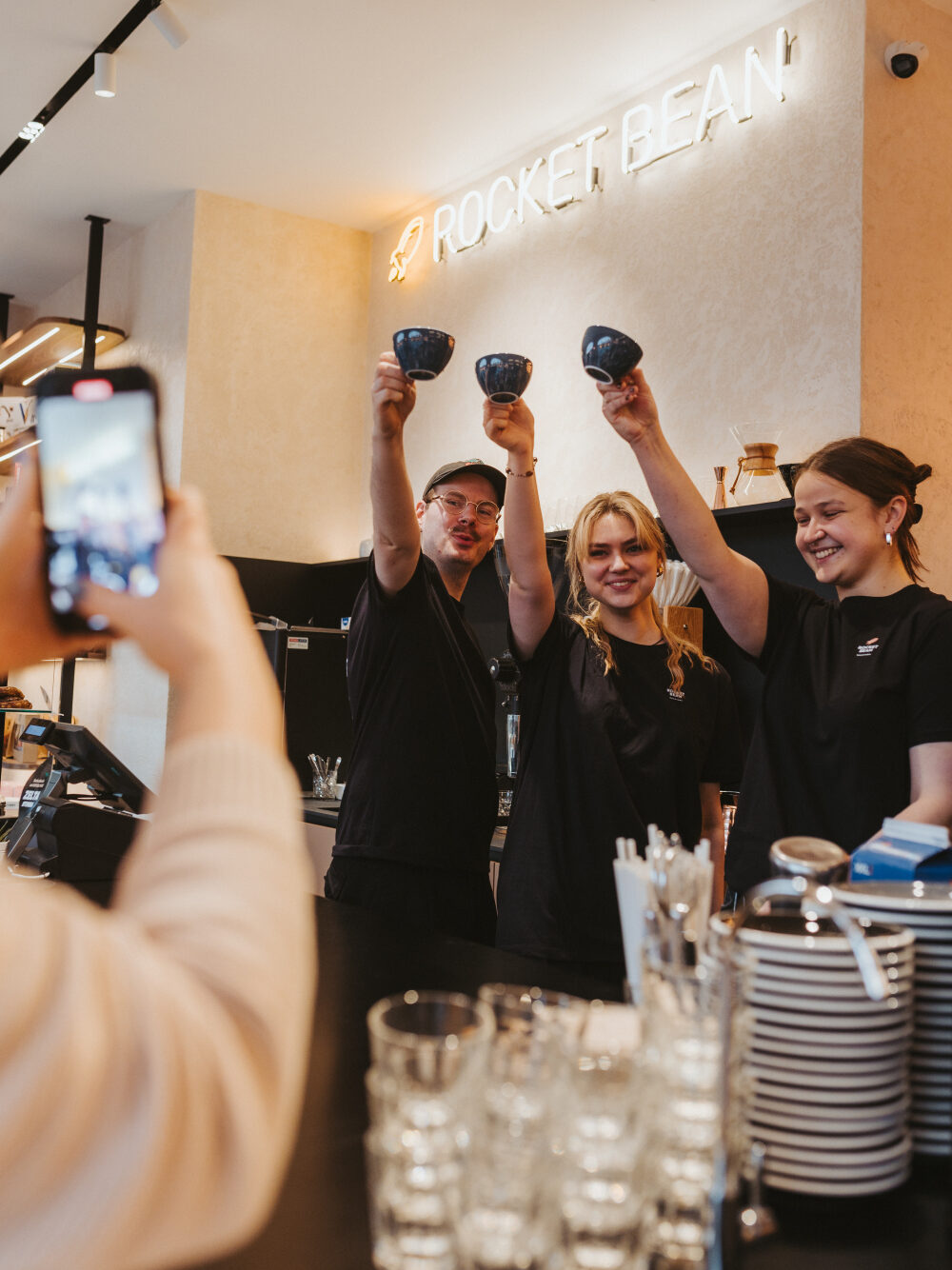
How do you maintain consistency in the quality of coffee you serve?
For me, it always comes down to the team – consistency isn’t something one person can achieve alone. It’s about strong teamwork, clear workflows, and a shared commitment to excellence. We focus not only on the coffee itself, but on the entire experience. Quality comes from every touchpoint, from preparation to presentation, and most importantly, from genuine hospitality. Great coffee served with care and warmth is what truly creates consistency.
How did it feel to take part in The Barista League?
It was an amazing experience, especially because it was my first time competing in a large-scale event. What drew me to The Barista League was its unique focus: it’s not just about coffee knowledge, but also about service and the atmosphere. I believe that’s incredibly important, because without good hospitality, there’s no truly great coffee experience.
Another highlight was the incredible sense of community. The Barista League brings together people who are passionate, supportive, and creative – it felt more like a celebration than a competition. That shared energy and connection made the whole experience truly unforgettable.
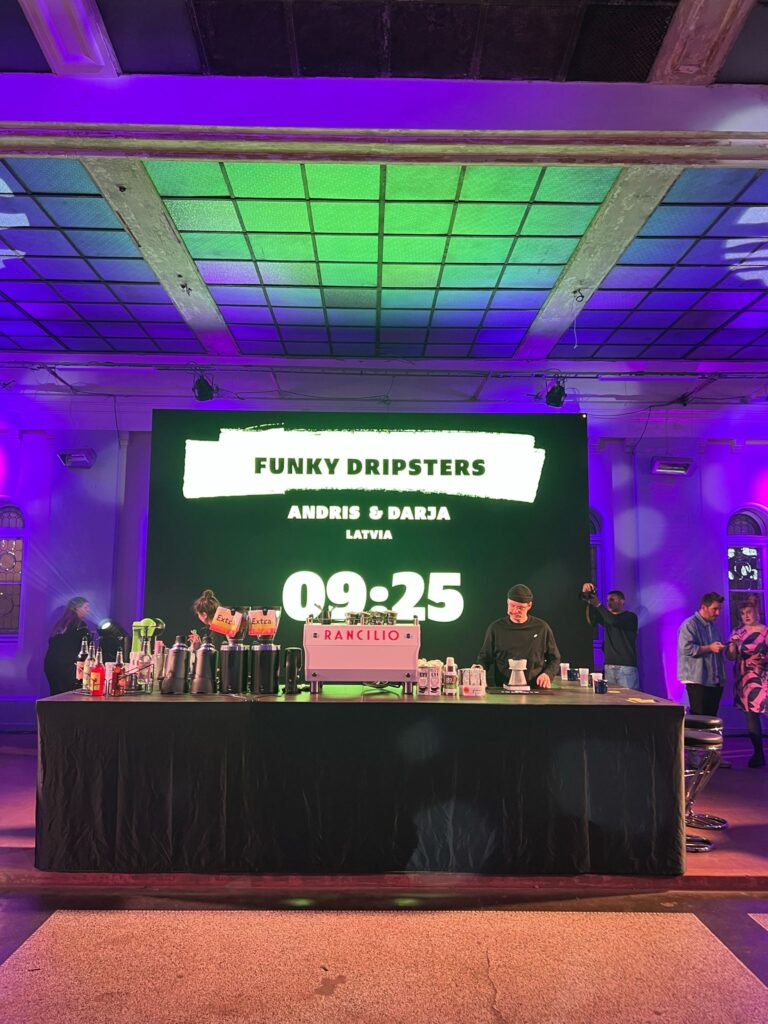
Did you take part in other coffee competitions or plan to in the future?
Yes, I have a few local competitions in mind—mostly to keep my coffee skills sharp and to stay engaged with the craft. It’s also a great way to inspire and motivate my team. In the autumn, I’m planning to organize the Coffee Triathlon again, which is something I’m really excited about. Events like that bring people together, challenge us in fun ways, and keep the passion for coffee alive.
If there were one piece of knowledge about coffee you’d like everyone to know, what would that be?
I might be repeating myself, but I truly believe this: there is no good coffee without good service. You can have the best beans and perfect technique, but if it’s not served with warmth and care, the experience falls flat. Hospitality is what brings coffee to life—it turns a drink into a moment people remember.
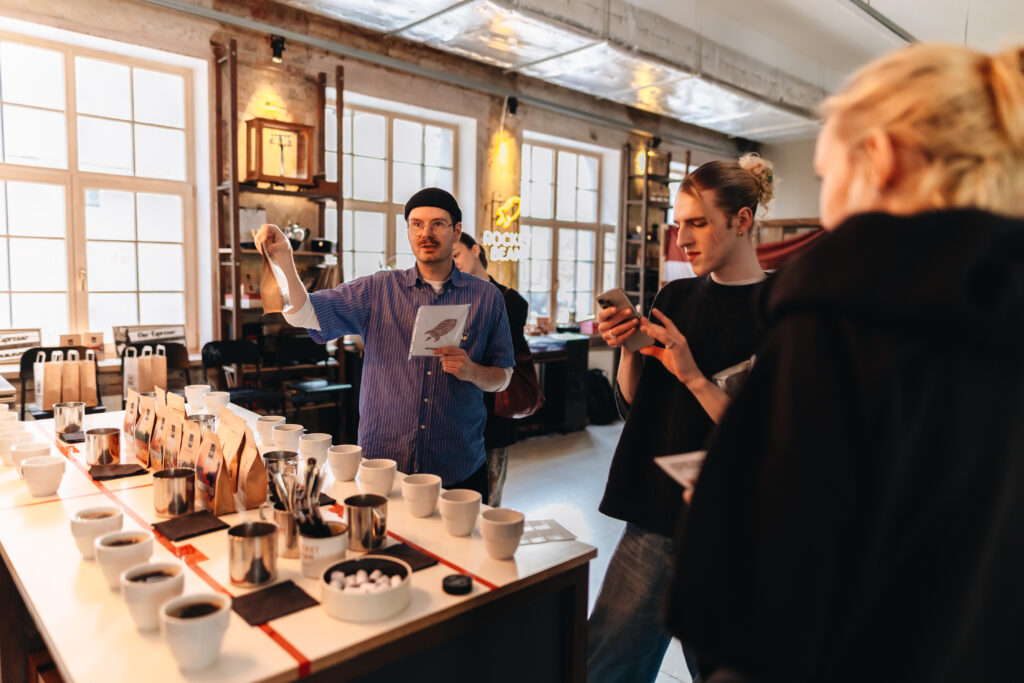
What are your passions and hobbies apart from coffee?
Photography is my second language—it’s how I express myself. For me, it’s more than just taking pictures; it’s a way to translate emotions into visual metaphors. Especially when I travel, I try to capture the atmosphere of the moment, not just the place. It’s a creative outlet that helps me stay present, observant, and connected to the world around me.
What coffee challenges are you looking forward to? Any new projects or collaborations?
This autumn, I’m excited to bring back the Coffee Triathlon with even more fun and celebration of skills, creativity, and community. Beyond that, one of my main goals is to stabilise and strengthen my team, because everything starts with people. I’m also committed to helping grow the specialty coffee community here in Latvia, through collaboration, sharing knowledge, and creating spaces where coffee culture can thrive.

Quick Fire Questions for Andris Romanovskis:
Filter coffee or espresso-based?
Filter coffee.
Milk coffee or black coffee?
Milky for breakfast, black for later.
The most underrated coffee drink?
Ristretto.
The most underrated coffee brewer?
French Press.
What brewing method do you use at home?
V60 or Moka pot.
The number one place in Europe that every coffee geek should visit?
Rocket Bean Miera, Riga.
Favourite city outside your own for a coffee tour and why?
Berlin – high density of independent cafés and roasters.

